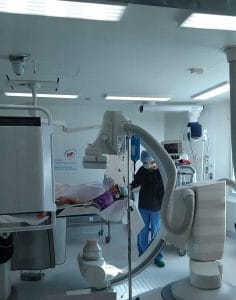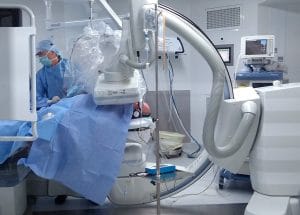
The team of the department of anesthesiology saw the potential of HappyMed to distract patients during transcatheter aortic valve implantations (TAVI), which are usually performed under local anesthesia, and approximately last 60 minutes.
“We have been searching for a possibility to acoustically shield our patients from the environment in the operation room. Conversations of the medical staff during surgery can cause anxiety and insecurity in patients. With HappyMed, we go one step further, by comforting our patients with both, audio and visual distraction.”
By means of questionnaires, patients were interviewed about their well-being and satisfaction with HappyMed, but also doctors gave their feedback on the use of HappyMed in the field of cardiovascular procedures. Evaluation results were favorable throughout: 70% of patients would like to use the HappyMed Video Glasses during this type of treatment again. In 88% of the cases, doctors would recommend the use of HappyMed.
“Essentially, most of the patients are highly nervous before and also during the operation. Since most patients are elderly and high-risk-patients, the surgery bears an additional risk of serious complications such as sudden blood loss or cardiac dysrhythmia. The HappyMed Video Glasses serve as a non-pharmacological alternative to sedation, which is commonly used to deal with patients’ anxiety in cardiovascular procedures. As a consequence, further drug-induced risks of complication can be minimised for patients, who are already at risk for severe complications.”

Furthermore, the German Heart Center Berlin was elected to streamline one of their TAVI procedures in the course of the well-known and international cardiovascular congress Aortic Live 2018 in Essen, Germany. The patient who was scheduled for this surgery chose to use the HappyMed Video Glasses during the procedure, hereby demonstrating the new technology to more than 400 doctors of 41 countries.
HappyMed was delighted with this first collaboration with the Deutsches Herzzentrum Berlin, and looks forward to the 100-patient TAVI pilot study planned for 2019.